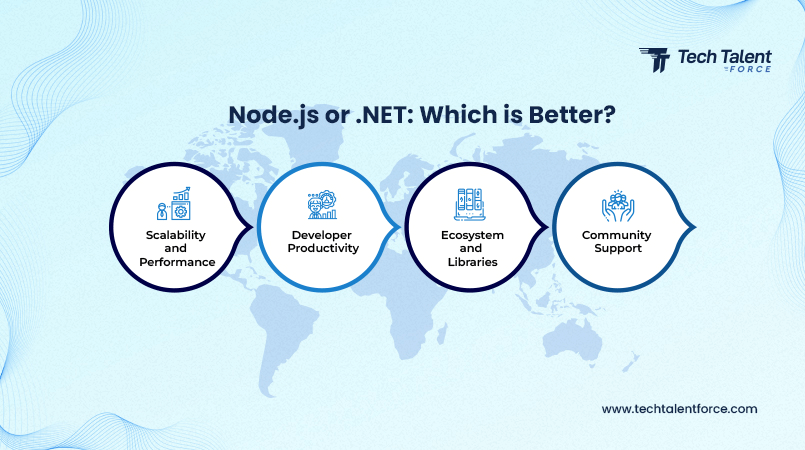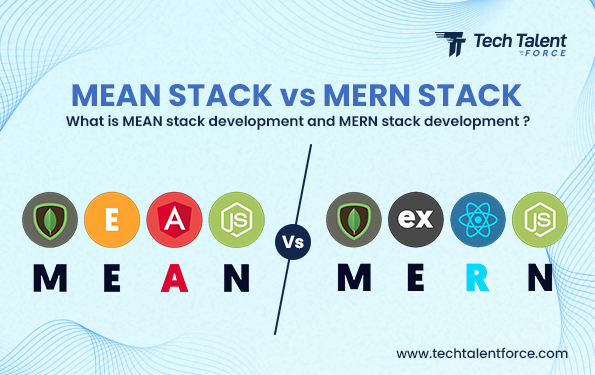Introduction:
In the ever-evolving landscape of web development, choosing the right technology stack is a crucial decision that can significantly impact the success of a project. Two heavyweight contenders that often find themselves in the ring are .NET and Node.js. Developers worldwide are often faced with the dilemma of choosing between these two giants, each offering its own set of strengths and capabilities. In this blog, we’ll delve into the intricacies of Node.js web app development, Node.js for API development, .NET development, and Cross-platform .NET development to help you make an informed decision. So, let the ultimate showdown begin!
Node.js for Web App Development:
Because it can create web applications that are both scalable and high-performing, Node.js has become extremely popular. Its event-driven, non-blocking I/O model allows developers to create applications that can handle a large number of simultaneous connections efficiently. The lightweight and fast nature of Node.js make it an ideal choice for real-time applications, such as chat applications, online gaming platforms, and collaborative tools. In today’s rapidly evolving tech landscape, empowering developers to build applications with Node.js has become a cornerstone for creating scalable, efficient, and feature-rich solutions.
When it comes to Node.js web app development, the platform’s vibrant ecosystem of packages and modules, thanks to npm (Node Package Manager), provides developers with a wide range of tools and libraries to expedite the development process. The flexibility of JavaScript as the primary language also enables developers to seamlessly transition between frontend and backend development, streamlining the overall workflow.
Node.js for API Development:
Node.js has become a go-to choice for API development due to its ability to handle concurrent requests and its asynchronous nature. With Node.js, developers can create lightweight and efficient APIs, making it a preferred option for building microservices architectures. The event-driven architecture ensures that the server remains responsive even under heavy loads, making Node.js a solid choice for developing APIs that demand high performance.
Furthermore, the extensive support for JSON (JavaScript Object Notation) in Node.js simplifies data interchange, making it easier to work with modern web applications. The platform’s single-threaded, event-driven model enables seamless handling of multiple API requests concurrently, resulting in improved response times.
.NET Development:
The USA’s.NET development industry is thriving in the quickly changing technological landscape, demonstrating its adaptability and strong capabilities in driving creative solutions across a wide range of sectors. On the other side of the ring, we have .NET, a robust and mature framework developed by Microsoft. .NET has been a staple in enterprise-level application development for many years, offering a comprehensive set of tools and libraries for building scalable, secure, and feature-rich applications. .NET supports multiple languages, including C# and F#, providing developers with the flexibility to choose the language that best suits their preferences and project requirements. .NET Developers play a pivotal role in crafting robust and scalable solutions, leveraging the power of the .NET framework to deliver innovative software applications.
One of the notable strengths of .NET is its integration with Microsoft technologies, such as Azure, providing developers with a seamless environment for deploying and managing applications. .NET applications are known for their stability and performance, making them suitable for a wide range of scenarios, from desktop applications to large-scale web applications.
Cross-platform .NET Development:
In recent years, Microsoft has made significant strides in making .NET more cross-platform-friendly. The introduction of .NET Core, a modular and lightweight version of the framework, has allowed developers to build and run .NET applications on various operating systems, including Windows, Linux, and macOS. This cross-platform compatibility has expanded the reach of .NET, making it a viable option for developers who prefer working in non-Windows environments.
The availability of cross-platform .NET development has blurred the lines between traditional .NET and other cross-platform frameworks, creating new possibilities for developers to choose the right tool for their projects based on their specific requirements and preferences.
Node.js or .NET: Which is Better?
The choice between Node.js and .NET often depends on the specific needs of the project, the developer’s expertise, and the overall project goals. Here are some factors to consider when making the decision:

1. Scalability and Performance:
- Node.js excels in handling concurrent connections and is well-suited for applications that require real-time communication, making it a strong contender for scalable and high-performance applications.
- Whether you're building scalable web applications or optimizing server-side performance, having a skilled Node.js Developer on your team is crucial for harnessing the full potential of this powerful runtime environment.
- NET, with its mature ecosystem and optimizations, is known for delivering stable and performant applications, especially in enterprise-level scenarios.
2. Developer Productivity:
- Node.js, with its JavaScript-based stack, offers a lightweight and flexible development environment. Developers familiar with JavaScript can seamlessly transition between frontend and backend development.
- .NET provides a comprehensive integrated development environment (IDE) with Visual Studio, offering powerful tools and features that enhance developer productivity. The support for multiple languages allows developers to choose the language they are most comfortable with.
3. Ecosystem and Libraries:
- Node.js boasts a vast npm ecosystem, providing developers with a plethora of pre-built modules and packages. This extensive collection accelerates development and allows developers to leverage existing solutions for common functionalities.
- .NET, with its NuGet package manager, offers a rich ecosystem of libraries and frameworks. The integration with Microsoft technologies enhances the overall development experience and provides seamless integration with Azure services.
4. Community Support:
- Node.js has a large and active community, contributing to the continuous growth and improvement of the platform. The community-driven development model ensures the availability of resources, tutorials, and support.
- .NET, backed by Microsoft, has a strong and supportive community. The official documentation, forums, and community-driven initiatives contribute to the overall success and adoption of the framework.
Node.js and .NET Developer Perspective:
From a developer’s perspective, the choice between Node.js and .NET often comes down to personal preferences, experience, and the specific requirements of the project. Here’s a brief overview of how developers view each platform:
• Node.js Developer Perspective:
-
1.Node.js developers appreciate the platform's simplicity, agility, and the ability to use a single language (JavaScript) for both frontend and backend development.
-
2.The non-blocking I/O model is seen as a major advantage, especially when building real-time applications or APIs that require handling a large number of concurrent connections.
-
3.The vibrant npm ecosystem is a significant draw, allowing developers to easily find and integrate third-party packages into their projects.
• NET Developer Perspective:
-
1..NET developers value the stability, security, and scalability that the framework provides, making it a preferred choice for large-scale enterprise applications.
-
2.The integration with Visual Studio is often praised for its powerful development tools, debugging capabilities, and overall ease of use.
-
3.With the introduction of .NET Core, developers appreciate the cross-platform compatibility, allowing them to use .NET in diverse environments.
Conclusion:
In the battle of Node.js vs .NET, there is no one-size-fits-all answer. The choice between these two technologies depends on the specific needs of the project, the expertise of the development team, and the overall goals of the application. Node.js shines in scenarios where real-time communication and scalability are crucial, while .NET excels in building robust, secure, and enterprise-level applications.
Ultimately, the decision boils down to understanding the strengths and weaknesses of each platform and aligning them with the project requirements. Developers should evaluate factors such as performance, scalability, developer productivity, ecosystem, and community support to make an informed choice between Node.js and .NET. Whether you embark on the journey of Node.js web app development or opt for the stability of .NET, both technologies offer powerful tools and capabilities to bring your web development projects to life.
Find out more information about Node.js and .Net development, visit – Tech Talent Force.





No Comments